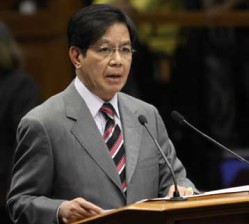Only God knows when life begins—Lacson

Former Sen. Panfilo Lacson. INQUIRER FILE PHOTO
Only God knows when life begins and so He alone can declare the reproductive health (RH) law unconstitutional.
Former Sen. Panfilo Lacson offered this view a day after Supreme Court justices, at Tuesday’s opening of oral arguments on the controversial measure, raised what was regarded as a key issue in the bid by its Church-backed opponents to derail a state program to control the country’s runaway population growth by issuing contraceptives.
“When does fertilization occur?” Senior Associate Justice Antonio Carpio asked. “The time of fertilization, or upon the implantation in the walls of the uterus?”
Carpio rued that the magistrates, none of whom were doctors, were being asked to determine the moment of conception.
“Good points raised by Justice Carpio. When does conception start? No member of the court is competent and qualified to know,” said Lacson, who was one of 13 senators who voted for the law signed by President Aquino last December. On March 19, the high court suspended the implementation of the law for 120 days to hear the challenges against it.
Article continues after this advertisement“I say only God knows if after sexual contact, there will be conception. So only God can declare the RH law unconstitutional,” he said in a text message on Wednesday.
Article continues after this advertisementNothing new
“What if the members of the court were wrong about how God interprets the time of conception? Then those who would vote to declare the law unconstitutional would become sinners. The same is true for those who’d say otherwise,” Lacson added.
Sen. Pia Cayetano, the sponsor in the Senate of the RH bill, on Wednesday said there was nothing new in the arguments of the petitioners that life began with fertilization and keeping a fertilized egg from getting implanted in the womb through contraceptives made available by the government was as good as murder.
“I’ve heard it said that for a man to masturbate is ‘murder,’ and so to say that, that (the RH Law) is ‘genocide,’ then it tells us what kind of discussion we have,” she said.
“I’m just saying let people draw their own conclusions. If these are the kinds of statements that the petitioners make, I leave it up to them to draw their own conclusions,” she added.
Former Sen. Francisco Tatad, one of the petitioners, told the justices that the measure was neither a responsible parenthood law nor a health program but a population control legislation.
By providing contraceptives, Tatad said, the Aquino administration has violated not only the Constitution but also international conventions such as the 1948 Convention on the Prevention and Punishment of Genocide that the country signed in 1950.
The 1987 Constitution states that the government “shall equally protect the life of the mother and the life of the unborn from conception.”
“I have defended the RH law when it was still a bill. I’ve heard all the arguments and I’m not really surprised by anything,” Cayetano said.
No coercion
Cayetano said she was standing by her belief that the RH law was constitutional “because the allegation that they have made on equal protection, by way of not protecting life, is unfounded.”
“First of all, the right to choose is always there. It is written throughout the law that no one is being coerced to do anything, and it is also written throughout the law that only family planning methods that are considered safe, legal and nonabortifacient will be made available,” Cayetano said.
The only doctors who believe no life is formed during fertilization are those involved in planned parenthood programs through the World Health Organization and pharmaceutical firms, said Sen. Vicente Sotto III, an opponent of the measure.
“On the issue of when does life begin, common sense dictates that upon fertilization, on the way to implantation, the fertilized egg is already alive. Prudence dictates that in case of doubt, you decide for life,” Sotto said. “For example, when you’re hunting, you sense a movement behind a bush, you don’t know if that’s a pig or a man, will you shoot?”
Religious freedom
Sotto said the RH law’s constitutional issues also involved religion. “Artificial contraceptives aren’t allowed among Catholics and Muslims, why will you make them available through a law? Where is religious freedom?”
The Supreme Court hearing, which lasted five hours, will continue on July 23 with three more anti-RH speakers scheduled before proponents of the measure take their turn.—With Maila Ager, INQUIRER.net
Originally posted at 8:16 a.m. | July 10, 2013